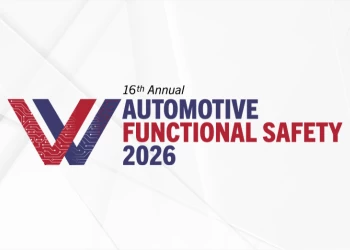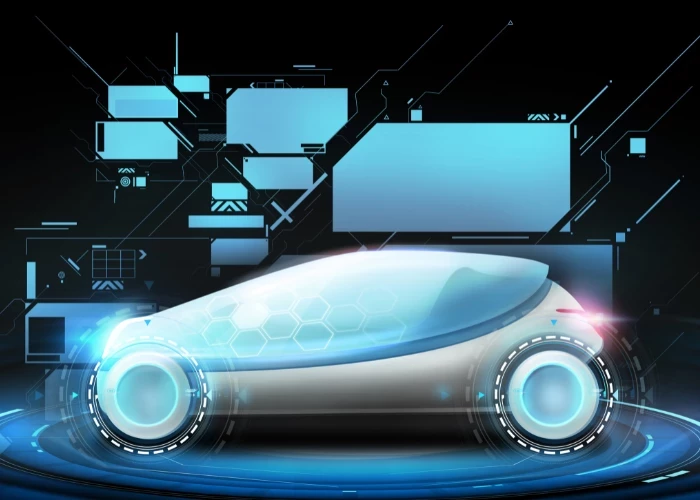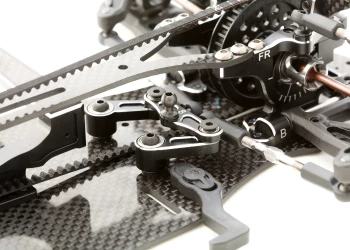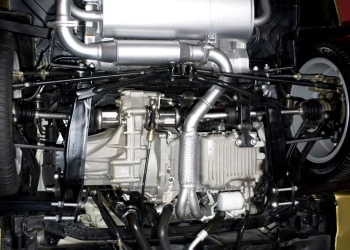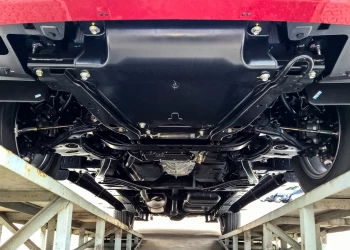Developments in Automotive Brake Technology: The Future of Braking
Add bookmarkThe brakes are one of the most important pieces of safety equipment on a vehicle. Not surprisingly, braking is an exciting area for development within the automotive industry with a number of technologies competing to improve safety and overall efficiency.
"New brake systems and the electrification of all auxiliary drives in the vehicle will make the conventional brake systems obsolete. That's my personal conviction."
Automotive IQ spoke with Professor Jýrgen Stockmar, Hon. Professor, Institute for Powertrains and Automotive Technology, Vienna University of Technology, Austria, in order to learn more about the latest developments in the industry and to gain insight into which ones have potential. Professor Stockmar is a true automotive engineer who has had the good fortune of being able to combine his job with his passion.
Jýrgen Stockmar: I am one of the very rare real automotive engineers. I actually studied automotive engineering whereas most of my colleagues are mechanical engineers. During the last three-plus decades, I’ve worked solely in the automotive industry on both sides. I’ve worked for suppliers like Solex, Steyr-Daimler-Puch and Magna International. On the other hand, I worked with OEMs such as Audi and Opel to name two. That's one of the reasons why I say I have knowledge of both sides. I know what both sides are expecting from the other. I think that's very important, especially in my current employment as a consultant. I hope that I can transfer some of my personal knowledge to my clients.
On the other hand, for many years now, I've been giving lectures at the Vienna University of Technology, where I can also transfer my experiences to my students.
As a young engineer I have designed and built my own racing car, an open two-seater sports car that has been successfully raced in Europe by top drivers. Later on I also used to compete with several racing cars and now I've switched to classic cars.
You really are living the dream and are passionate about the industry.
JS: I think so, yes. I'm not complaining at all! My job is and was my passion. You're absolutely right.
What do you think are the main challenges that the OEMs and their suppliers face with regard to brake systems?
JS: Number one is certainly reliability and safety. That's absolutely clear. In the future we have to have an inside look into zero drag. Common brakes are not offering zero drag as they always have a little drag left. I think the next step will be real individual braking not only for the current ESP systems which we already know. Torque vectoring will also be the future, especially when looking into electric vehicles. I believe, for that, we need extremely quick-activating parts. When companies like Bosch and Continental presented their new brake boosters, the reduction of activation time was a very important item.
They're really proud that they can offer extremely short activation times of approximately 120 milliseconds. That's a good time but in the future the electric-mechanical brake systems can be even faster. Then a very important change will be the combination engine – regenerative braking of the electric motor/generator.
That's not as easy as it sounds because we need perfectly tuned software for that. We need the systems that are able to work perfectly together. This will be the next challenge and we have to know that in the future the brakes will work without the conventional energy source, namely vacuum. That's one of the reasons why I personally believe in the electro-mechanical brake. Conti, Bosch and TRW are going in different directions right now, but we will come to that later on…
The major supplier companies all have electric braking systems available but what is delaying them from implementing them on production vehicles?
JS: From my point of view there are at least two general reasons for the delay. First, reliability and safety are of utmost importance and the suppliers do not want to run any risk with an early introduction of an electric brake system. That's one of the reasons why they are delaying. This is one of the reasons why Continental put the wedge brake on hold when they bought Siemens VDO because they were not convinced that, at the end of the day, it would be 100 percent reliable. But they're working on that.
Number two is the development cost. The necessary investments are tremendous for the production lines of a new brake system - at least several hundred million euros - and this is a reason why for example, Bosch, Continental, and TRW have now presented their brake boosters in order to present a bridge technology. I think the brake boosters are indeed bridge technologies. Eventually they will present their electro-mechanical brake systems.
Today we see only three different systems when we look at the electro-mechanical brakes. There's the ball screw, the wedge brake from Conti and the cam-disc brake as it has been developed by Vienna Engineering. The latter two have the possibility of self-amplification and that's very important. Self-amplification will certainly be a unique selling proposition for the electric brake and I do not know any design of a ball screw brake that is offering the same proposal.
The wedge brake has not been continued since Conti bought Siemens and to my knowledge all the different designs of the ball screw brake need a big motor or gear ratio and they are, interestingly, always a part of the 42 or 48-volt discussion because of the big electric motor they need. That leaves the cam disc which, for me personally, seems to have some good advantages and, most importantly, it is a proven electro-mechanical system. During my time at Steyr-Daimler-Puch we developed a very similar system for the control unit of the BMW four-wheel drive system so I know it works, it's reliable, it's proven and almost all the different components can be more or less used off the shelf. That means the design is ready.
Can we take that as you picking a winner?
JS: Probably because I've already worked on that system. Also, for other applications, I think the cam-disc brake could be a winner. However, the company who developed that, and have since gotten patents for it, is a very small company situated here in Vienna. It might well be that the company is too small to guarantee a breakthrough in electro-mechanical braking. Remember that whenever we're looking at evolution or revolution, the big companies have the power to overrule all the other inventors.
That's the nature of any mature industry.
JS: Right, but as an engineer I am in favour of the cam-disc brake. What could be helpful in that case would be that a big OEM, Volkswagen or Toyota or you name them, sees the advantages of the cam-disc system, and says we want that system. Then the others have to follow.
Sure, they might be able to buy up a small company with promising technology and then fund it. To continue looking specifically into braking, what developments have been most influential over the past five years and what developments do you see having a major impact looking ahead five years?
JS: There we have two different arguments. During the last decade, perhaps even more than the last decade, I saw two completely different development lines. On the one hand there was, and still is, a growing demand for more braking power, because of the competition you can call it a race for more engine output. Five hundred horsepower today for a sports car is already the average. That's one of the reasons they need big brakes and this demand is being met with ceramic discs and new asbestos-free brake pad materials, brake calipers with six and even eight pistons and so on. That was one development line.
The other direction that we all can see is caused by the demand for light brake design and low-cost solutions. That's one of the reasons why all the parts have to be optimised for weight and costs and constantly improved software, for example, for FEM calculation and so on…the need for optimising material utilisation. The normal customer doesn't know that, doesn't see that. But I have worked with our calculation department and it's always astonishing for me to see what you can do today with modern calculation software.
That was a look back in the rear view mirror and now looking ahead I see the major impact coming from the growing market penetration of electric vehicles and also hybrids. Developments are needed for these types of vehicles. New brake systems and the electrification of all auxiliary drives in the vehicle will make the conventional brake systems obsolete. That's my personal conviction.
Conti and Bosch and TRW and others may see it differently but am convinced at the end of the day this will be right. That's the reason why I say very soon we will see a competitive electric-mechanical brake system and then there will be an impact on upcoming vehicle generations. We are normally talking about passenger cars but we should not forget that there are interesting applications also in commercial vehicles when they go into hybrids, for example, busses for inner city traffic, collection trucks and so on. This is my view into the near future.
Along the same lines, do you see some of the kinetic energy recovery systems that we're more familiar with in hybrids or electric vehicles also having an application in traditional vehicles as we move along? Perhaps powering some alternative functions in the car?
JS: You’re thinking of a KERS system as we know it from Formula 1 then implemented into a normal passenger car, right? Some vehicles certainly will feature that system in the near future due to the very stringent fuel consumption regulations in the EU and also in other countries around the world. I see that coming, but once again it can only be a bridge technology before we go into hybrid and the electric vehicle markets. On the other hand I must say, right now I'm not a fan of the electric vehicle because electric vehicles today are not at all a dream technology. It will only be a dream technology in the near future, or the far future, when electric energy comes from regenerative sources. This will be a long way and will be an extremely costly way so people will be surprised, if not shocked, by the future price of electric energy.
What technological role has motor sport played in road going cars?
JS: The performance of discs, with ceramics or carbon fibre matrixes, the brake pad materials, the brake fluids and brake calipers have all been significantly improved by the special development for motor sport vehicles. Without motor sport, all the developments that have come would have come later. Some of these improvements found their way in the course of the technology transfer into the standard brake systems for road vehicle cars, particularly for sports cars.
However, we must bear in mind that the normal passenger vehicles are asking for more brake comfort, especially noise, vibrations and lifetime for the brake pads, for the discs and so on, than normal racing cars. So not all the development could be transferred into a normal road going car, but a good portion of braking power has been transferred from the motor sport into road-legal cars.
During the economic downturn, a lot of factory and other teams have either gone under or have closed shop on some of their motor sport. This is also sad for development.
JS: It is. On the other hand, brake systems are a very good example of how motor sport can influence modern technology for road going cars so that the knowledge is being disseminated from motorsport into other areas. And most importantly, the engineering teams have a completely new approach to development. If a company is rotating the engineering part of the development group from engineering for road going cars into motor sport and vice versa, I think that under these conditions, you will have the best output.
People always being able to think out of the box and come back and re-apply.
JS: Absolutely, that's the point.
Given the conservative nature of the industry, innovation is often of the evolutionary type, I think we mentioned this earlier, are there any potential revolutionary or disruptive innovations that you see on the horizon?
JS: I could answer that question with a simple "No" but it would be too short. Let me go deeper into that topic. We discussed the future market of hybrid and electric vehicles, and I think this is a very important point. In the long run they will solely feature electric mechanical brakes. That's my conviction. In combination with electric drives, the load on brake systems will be reduced because the electric generator will take over a bigger portion of the brake load, as we already discussed, recuperating a good part of the kinetic energy of the vehicle.
That means, in combination with the electric motors which then are working as generators, the normal brake load will go down, so brakes can change. They will be lighter and perhaps be cheaper. However, in-wheel brake, electric hub motor and suspension combination, the deeper integration of the standalone brake system will be the next evolutionary step though it will certainly not be a revolution. And we know what Conti, Michelin and Edison, have presented in recent years. They are all pointing in the same direction.
There will be a combination of brake, motor, suspension systems in the wheel, in the rims. Then vehicles will show a modular design concept and perhaps in the future it will be even easier to build up more vehicle types based on the same technology. Savings is exactly the point. I have to mention that because cost reduction is one of the most important tasks for every engineer in the past and, of course, will be in the future, perhaps even more so. For that reason I can only see evolution going on without a disruptive revolution right now. I'm not visionary enough to say, okay, there's a revolution coming up on the horizon.
Maybe from a slightly different perspective, would you see any revolutions for the end user? I always think of anti-lock brakes as being a bit revolutionary because it required the driver to re-think and re-learn how they brake in a panic situation. Could we see anything like that from the upcoming technologies?
JS: A brake system that brakes without the driver in an emergency situation for me is not a revolution - quite honestly - because you can already buy that today.
Buy a new Mercedes S Class and you will have it as a standard feature. That's the reason why I'm not mentioning it. Of course, it will change brake behaviour. We know that only approximately 50 percent of drivers are able to brake the right way in an emergency situation so then this will be a great help. You're absolutely right: It was a revolution but it's already on the market.
I would like to come back to an article that was written in the year 1917 by a so-called engineering expert. He wrote, "All the different developments and evolution in the automotive industry have been done. From now on we will only continue in the existing and known technology." Of course that was extremely wrong and it would be extremely wrong to say the same today.
I think that's a fair point. We do often have trouble imagining what we haven't yet experienced.
JS: Yes, yes. When you're working with classic vehicles, as I do, in some cases I'm astonished how much our ancestors already knew, what they did, you can follow their ideas when you look very carefully into the design. On the other hand, sometimes you say, "God, why didn't they know that?" That's my point, evolution is continually going on.
Professor, I think you have had a very exciting career and, like I said, just seeing that you're still doing something that you're passionate about, it's inspiring.
JS: It's good to hear! Once again, my job is my passion and that's really great. Only a few people can say that.




